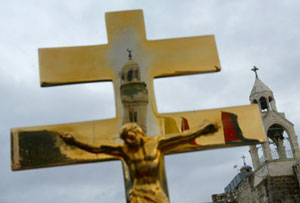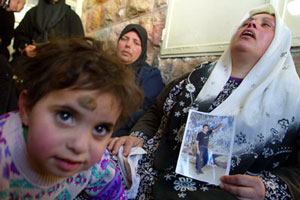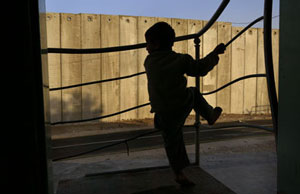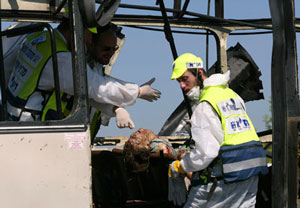 |
 |
The Peace Process
December 2003
|
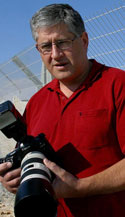 |
||||||||||||
|
Peace? In the Middle East you said? Probably as elusive as Saddam and his WMD's. I've been a photojournalist based in Israel and the West Bank since 1991 and must have covered almost every significant event here, in one way or another. Twelve years on, after seeing the end of the first Intifada, the Oslo peace process, the death of Rabin and his vision, and then a return to violence, nothing strikes me as much as the two old men, Sharon and Arafat, playing out their twilight days as if they were back on the battlefield of Beirut 1982! It is as if they were grandmasters of chess, using the lives of their people as pawns on a huge 3-dimensional chessboard. The conflict is not just between the Muslims and the Jews. It permeates every level of society. Different ethnic backgrounds and political views face off against each other.
The Christians of Bethlehem are not only caught between Israel and the Palestinians, but are also losing their traditional power over the Biblical town where Jesus was born to the growing Muslim majority. The thousands of Palestinian refugees who flocked to the town after the 1948 and 1967 wars, coupled with their higher birthrate, have transformed the Christian population into a minority in their town. They have fallen victim to the violence of the al-Aqsa Intifada, seen their Church of the Nativity turned into a refuge for Palestinian gunmen and their village of Beit Jala a sanctuary for the armed militants opening fire on Israeli targets on the east Jerusalem Jewish neighborhood of Gilo. One of the most surrealistic days I remember must be the day a Bethlehem Palestinian blew up a Jerusalem commuter bus. I live about an hour away, and the drive up to Jerusalem was a rush against time. Try to get to the scene while there is still something left to photograph. Listen to news radio all the way. The body bags are still there; lined up in front of the twisted remains of the bus. The hospital's just called. They're allowing us in to see the wounded. Unusual for Jerusalem but we'll take it. Then the word comes. The suicide bomber is from El Khader, from neighboring Bethlehem. Drive to the checkpoint, the Israeli soldiers there have yet to receive orders to seal the town, not to let anyone in or out. What a day, from covering a suicide attack against a civilian target to being witness to a family's first reaction to the news their son was the bomber. The father talks in praise of his son to the hovering TV crews, the mother collapses on the ground with his photo as her relatives and friends begin to gather round her.
A lot has been said about Israel's separation barrier, the one it is building in the West Bank. Israel says it needs it for protection against Palestinian militants, from suicide bombers. Palestinians say it's another Israeli land grab. Where it follows the Green Line, Israel's pre-1967 Six Day War border with the West Bank, the barrier, sometimes a fence, sometimes a wall, is generally regarded as acceptable. But when it diverts into the West Bank, tearing through olive groves and cutting Palestinian villagers off from their land, it becomes the target.
Finally there are the Israelis. They always seem divided: religious vs secular Jews, the Orientals vs the Europeans, the left-wing vs the right, and the extremists from all sides vs the rest. But when something happens, something bad, they tend to come together, if only for just a little while. Back in the 1990's, I covered Sabbath (Saturday) demonstrations. Hundreds of black-garbed ultra-Orthodox Jews, organized by Rabbi Yehuda Meshi-Zahav, blocked Jerusalem roads to prevent traffic from passing their neighborhoods. In 2003, volunteers of the religious ZAKA organization, led by the same Meshi-Zahav, are amongst the first to arrive at the scene of a disaster and often the last to leave, collecting human remains for a proper Jewish burial. As opposed to my feelings a decade ago, today I have the utmost respect for these men who put words into action, and in the name of their belief, have become the witnesses to the victims of what is commonly called ...
the Middle East peace process.
© David Silverman
Getty Images
|
|||||||||||||
|
Write a Letter to the Editor
Join our Mailing List
© The Digital Journalist
|
